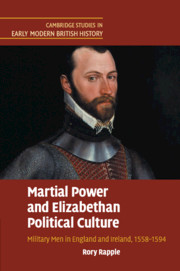Book contents
- Frontmatter
- Contents
- Acknowledgements
- List of abbreviations
- Notes on the text
- Political map of sixteenth-century Ireland circa 1534
- CAMBRIDGE STUDIES IN EARLY MODERN BRITISH HISTORY
- Introduction
- 1 Chimneys in summer
- 2 Martial men and their discontents
- 3 The limits of allegiance: English martial men, Europe and the Elizabethan regime
- 4 The captains and the Irish context
- 5 The limits of imperium: martial men and government
- 6 The limits of rhetoric: the captains and violence in Elizabethan Ireland to 1588
- 7 Unlimited indemnity: delegates versus viceroys
- Conclusion
- Bibliography
- Index
Introduction
Published online by Cambridge University Press: 02 July 2009
- Frontmatter
- Contents
- Acknowledgements
- List of abbreviations
- Notes on the text
- Political map of sixteenth-century Ireland circa 1534
- CAMBRIDGE STUDIES IN EARLY MODERN BRITISH HISTORY
- Introduction
- 1 Chimneys in summer
- 2 Martial men and their discontents
- 3 The limits of allegiance: English martial men, Europe and the Elizabethan regime
- 4 The captains and the Irish context
- 5 The limits of imperium: martial men and government
- 6 The limits of rhetoric: the captains and violence in Elizabethan Ireland to 1588
- 7 Unlimited indemnity: delegates versus viceroys
- Conclusion
- Bibliography
- Index
Summary
Yes. Why do we all, seeing of a soldier, bless him? bless
Our redcoats, our tars? Both these being, the greater part
But frail clay, nay but foul clay. Here it is: the heart,
Since, proud, it calls the calling manly, gives a guess
That, hopes that, makesbelieve, the men must be no less.
The urge to praise soldiers has proved strong in most cultures. This stems from a number of emotions commonly held: gratitude towards those who fight, kill and sometimes die for what we might identify with; sheer envy of the sudden action, the rare clarity and decisiveness of mortal combat; and, not least, the persistent belief that those who have engaged in that sudden action can attain some sort of heightened moral quality forged in them during their time in the gap of danger. Samuel Johnson famously said that ‘were Socrates and Charles XII of Sweden both present in any company, and Socrates to say “Follow me, and hear a lecture on philosophy;” and Charles, laying his hand on his sword, to say, “Follow me and dethrone the Czar;” a man would be ashamed to follow Socrates.’ This sort of admiration has been (for a long time, anyway) particularly strong in England.
- Type
- Chapter
- Information
- Martial Power and Elizabethan Political CultureMilitary Men in England and Ireland, 1558–1594, pp. 1 - 18Publisher: Cambridge University PressPrint publication year: 2009



